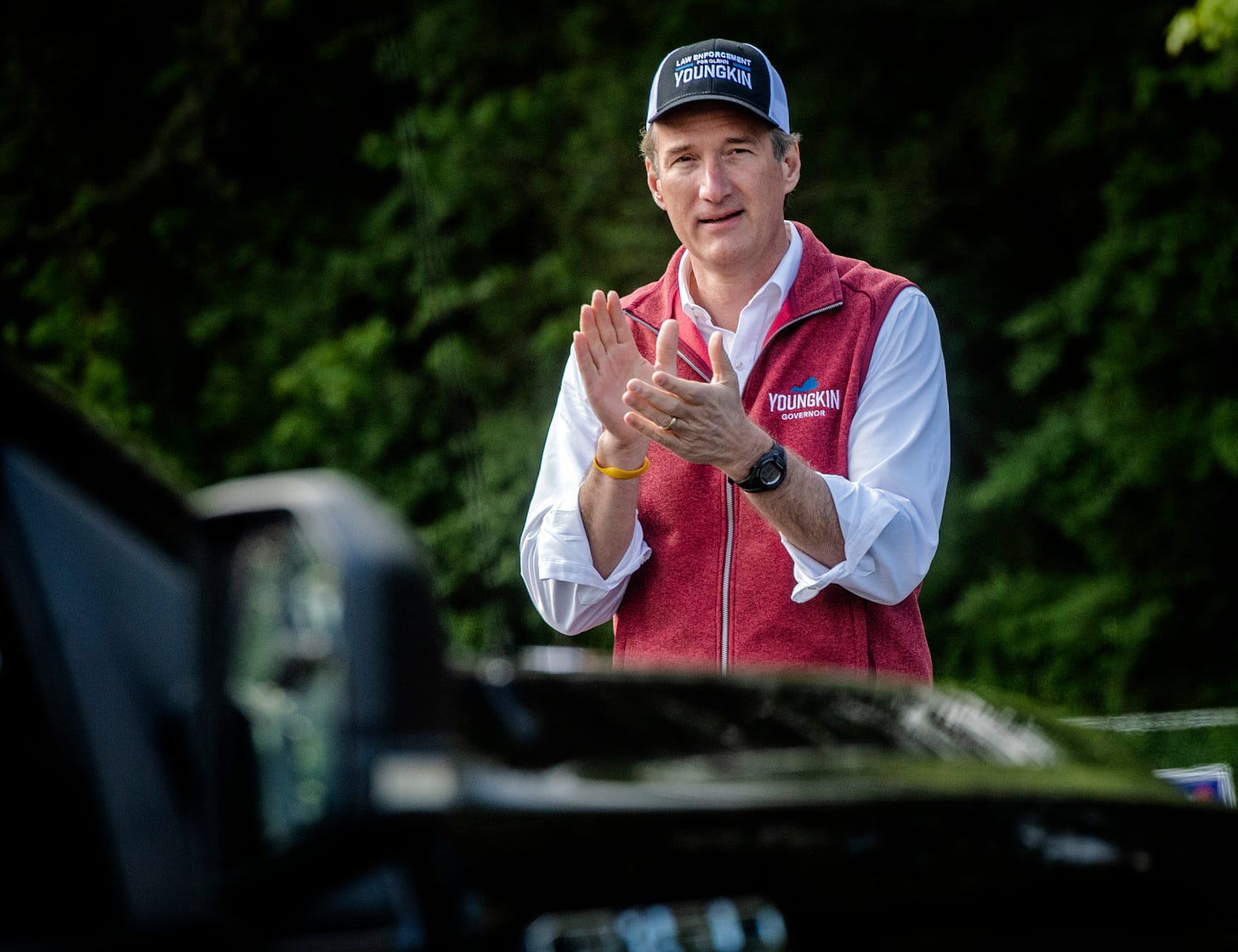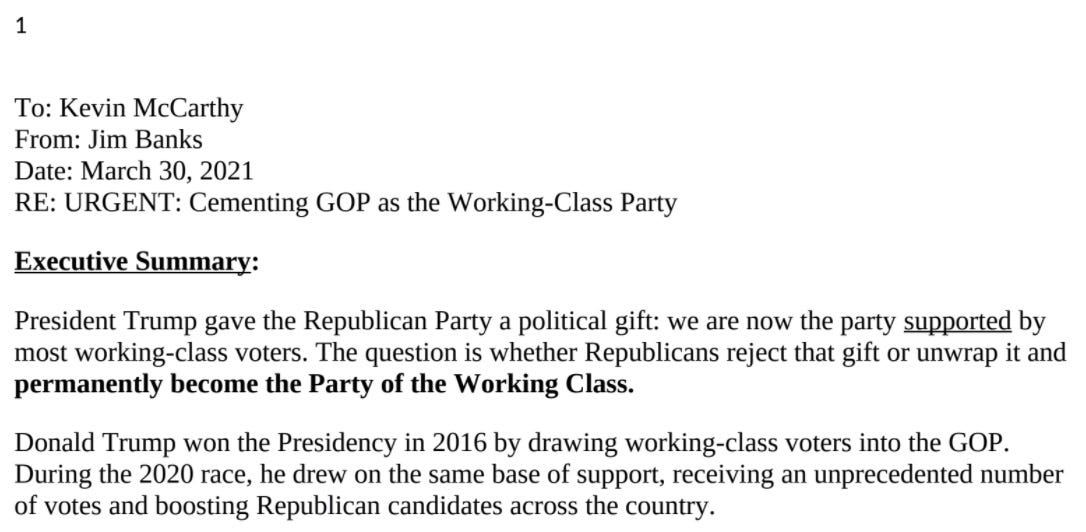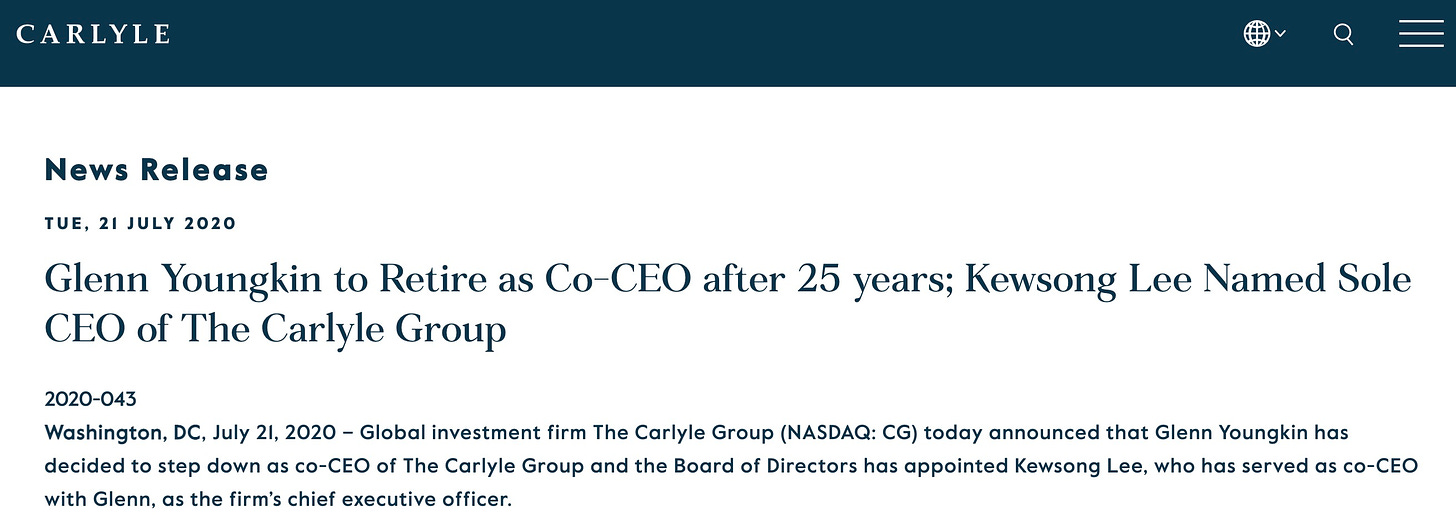Glenn Youngkin Is the Working-Class Hero Republicans Deserve
Finally, the GOP has cast off the globalist elites.

1. Virginia
Remember this?
Well, come meet the Republican nominee for governor of the commonwealth of Virginia, Glenn Youngkin!
Glenn Youngkin isn’t a professional politician. He’s a worker! Just last year his company threw a big retirement bash after he stepped down as . . . uh, CEO.
Okay, sure. He was a CEO and not a working stiff. But at least Youngkin was in the private sector, rolling up his sleeves every day to make stuff. To build things. Because what does the Carlyle Group do? Private equity and leveraged buyouts! The kind of business that real working-class Americans understand and appreciate.
It is a truth universally acknowledged that working-class men are always thrilled and excited when a private equity firm purchases their company in a leveraged buyout. “Restructuring” always means good things for workers and private equity is famous for showing deep concern for the welfare of employees and being totally, scrupulously fair as it takes distressed assets and spins them off for fast profits.
That’s why, even to this day, working-class Republicans revere Mitt Romney, another private equity guru turned politician.
Anyway, Glenn Youngkin will be treasured and loved by working-class Republicans because sure, he was the manager at his company. And sure, his company was a private equity firm. But at the end of the day, he had to sit at the kitchen table and balance his checkbook just like any regular guy trying to make do with a $19 million a year salary.
Also, working-class Republicans know that Glenn Youngkin is absolutely not a globalist elite. I mean, yes, his job as CEO of the Carlyle Group took him all over the world. The globe, if you will. And yes, the Carlyle Group did business with the bin Laden family.
And if you really want to pick nits, yes, on September 11, 2001 the Carlyle Group was hosting a conference in Washington and Osama bin Laden’s brother was their guest of honor.
Okay. Fine. On September 11, 2001 Youngkin’s $200 billion in assets private equity firm was hanging out with Osama bin Laden’s brother. When you put it that way, it sounds bad.
But you better believe that Glenn Youngkin is a true working-class hero.
Want to know why?
Because he speaks out on the only two issues that real working-class Americans care about today:
Youngkin refuses to acknowledge that Joe Biden was legitimately elected in a free and fair election.
His signature issue is “election integrity.”
That’s right. Joe Biden won Virginia by 10 points—nearly half a million votes—while Glenn Youngkin became the Republican nominee via a weirdo “drive-thru” convention with 30,000 participants in a process that went through six rounds of voting.
And Youngkin is the champion of election integrity.
Just like he’s the avatar of the working class.
It might sound crazy, but it makes sense once you understand that the only determining factor on acceptability for “working-class” Republicans today is a man’s willingness to publicly uphold a lie.
P.S.: Youngkin could absolutely win in November. He’s not the favorite, but if you discount the swing in partisan intensities this year, you’re crazy. In 2008, Barack Obama carried Virginia by +6 points. In 2009, Republican Bob McDonnell won the governor’s race by +17.
2. Reform
My friend A.B. Stoddard has an important piece on the idea of final-five voting:
With 86% of House seats already set in deep red or blue congressional districts, only the primary election matters. Whoever wins that first contest -- long before November -- will also win the general election. Since it’s all over before Election Day, general election voters simply don’t matter. It is only the engaged partisans, and single-issue activists, who choose the primary winner. It is only they who matter. Once that candidate arrives in Washington, the only people in their district they need to perform for to keep their job are those primary voters -- most of whom do not want the officeholder to compromise and reach across the aisle, and will choose someone else if their member does. . . .
To reverse this, Gehl designed a solution to repair the perverse incentives created by party primaries and plurality voting. Gehl's innovation, which she has termed Final Five Voting, combines top-five primaries with instant runoffs in the general election. The change 1) ends party primaries and creates open, nonpartisan primaries that send the top five vote-getters to the general election and 2) ends plurality voting with ranked-choice instant runoffs for those five candidates in the general election so a winner is chosen by a majority of voters.
Stoddard is talking about an idea put forward by Katherine Gehl. Her Ted talk on it is well worth your time:
I identify as ranked-choice curious. I’m not sure that I believe it can solve all of our problems. And if I had to pick just one reform—non-partisan redistricting or ranked choice—I’d probably take redistricting reform.
But this isn’t an either-or situation. Reformers can pursue both on parallel tracks.
3. Batman and Robin
I have reached the stage of life where the worst Batman movie ever made is playing on a loop in my house because apparently it is Citizen Kane for 4-year-olds.
Here’s an oral history of how Batman and Robin came to be:
“Jon Bon Jovi came by and he brought Cuban cigars for Arnold. So Arnold had them color it white so he could smoke it in the scenes,” says Stogie Kenyatta, who played a thug working for Mr. Freeze. . . .
After months of work (and testing some perhaps unsafe materials on extras), the Mr. Freeze look was perfected, with safe-for-humans acrylic paint applied to Schwarzenegger. Mr. Freeze had an entire 11-person unit dedicated just to him for a prep that took four hours in the morning. . . .
There were early warning signs that Batman & Robin might be in trouble. Schumacher had resisted sequel overtures from Columbia Pictures on 1985’s St. Elmo’s Fire (“I couldn’t see a sequel”), but went against that policy in this case. He and screenwriter Akiva Goldsman went straight from Batman Forever to A Time to Kill right back to Batman & Robin.
“Akiva was very leery about Batman & Robin. We had a couple of very serious discussions about it, and he was right about it in the long run,” says Schumacher.
And while toy companies and other corporate partners had wanted nothing to do with Batman Forever, everyone wanted in for the sequel. Schumacher learned what it means to make a movie toy-etic: “when you have something in the movie they can make toys out of.” Perhaps the production went too heavy in that direction.
Perhaps? Read the whole thing.






